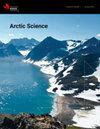Cumulative impacts of a gravel road and climate change in an ice-wedge polygon landscape, Prudhoe Bay, AK
IF 3.2
3区 地球科学
Q2 ECOLOGY
引用次数: 5
Abstract
Environmental impact assessments for new Arctic infrastructure do not adequately consider the likely long-term cumulative effects of climate change and infrastructure to landforms and vegetation in areas with ice-rich permafrost. This is due in part to lack of long-term environmental studies that monitor changes after infrastructure is built. This case study examines long-term (1949–2020) climate- and road-related changes in a network of ice-wedge polygons, Prudhoe Bay Oilfield, Alaska. We studied four trajectories of change along a heavily traveled road and a relatively remote site. During 20 years prior to oilfield development, the climate and landscapes changed very little. During 50 years after development, climate-related changes included increased numbers thermokarst ponds, changes to ice-wedge-polygon morphology, snow distribution, thaw depths, dominant vegetation types, and shrub abundance. Road dust strongly affected plant-community structure and composition, particularly small forbs, mosses, and lichens. Flooding increased permafrost degradation, polygon center-trough elevation contrasts, and vegetation productivity. It was not possible to isolate infrastructure impacts from climate impacts, but the combined datasets provide unique insights into the rate and extent of ecological disturbances associated with infrastructure-affected landscapes under decades of climate warming. We conclude with recommendations for future cumulative impact assessments in areas with ice-rich permafrost.冰楔多边形景观中砾石道路和气候变化的累积影响,普拉德霍湾,AK
北极新基础设施的环境影响评估没有充分考虑气候变化和基础设施对富冰永久冻土地区地貌和植被可能产生的长期累积影响。这在一定程度上是由于缺乏监测基础设施建成后变化的长期环境研究。本案例研究考察了阿拉斯加普拉德霍湾油田冰楔多边形网络中与气候和道路相关的长期(1949–2020)变化。我们沿着一条人迹罕至的道路和一个相对偏远的地点研究了四条变化轨迹。在油田开发前的20年里,气候和景观变化很小。在开发后的50年里,与气候相关的变化包括热岩溶池塘数量的增加、冰楔多边形形态、雪分布、融化深度、主要植被类型和灌木丰度的变化。道路扬尘严重影响植物群落结构和组成,尤其是小型杂类植物、苔藓和地衣。洪水增加了永久冻土退化、多边形中心槽高程对比和植被生产力。不可能将基础设施影响与气候影响区分开来,但综合数据集对几十年气候变暖下受基础设施影响的景观的生态干扰率和程度提供了独特的见解。最后,我们提出了对富冰永久冻土地区未来累积影响评估的建议。
本文章由计算机程序翻译,如有差异,请以英文原文为准。
求助全文
约1分钟内获得全文
求助全文
来源期刊

Arctic Science
Agricultural and Biological Sciences-General Agricultural and Biological Sciences
CiteScore
5.00
自引率
12.10%
发文量
81
期刊介绍:
Arctic Science is an interdisciplinary journal that publishes original peer-reviewed research from all areas of natural science and applied science & engineering related to northern Polar Regions. The focus on basic and applied science includes the traditional knowledge and observations of the indigenous peoples of the region as well as cutting-edge developments in biological, chemical, physical and engineering science in all northern environments. Reports on interdisciplinary research are encouraged. Special issues and sections dealing with important issues in northern polar science are also considered.
 求助内容:
求助内容: 应助结果提醒方式:
应助结果提醒方式:


